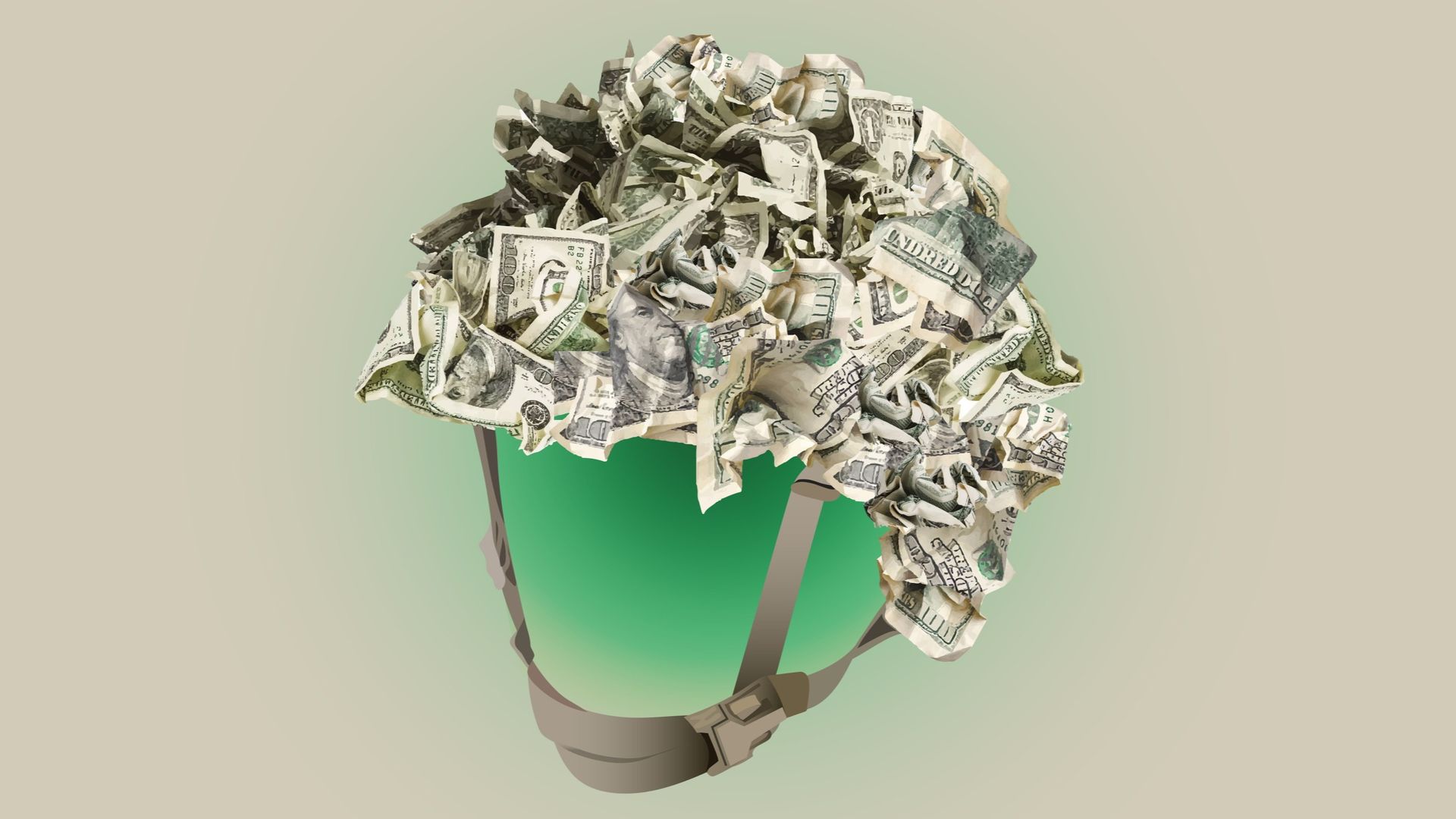尊敬的用戶您好,這是來自FT中文網的溫馨提示:如您對更多FT中文網的內容感興趣,請在蘋果應用商店或谷歌應用市場搜尋「FT中文網」,下載FT中文網的官方應用。

How did the word “capitalism” arise? If you ask most investors that question today, they might mutter about markets, commerce and Adam Smith — or Karl Marx. But according to Michael Sonenscher, a British historian, the term actually emerged first in 18th-century Europe in connection with war finance.
「資本主義」這個詞是如何產生的?如果你今天問大多數投資者這個問題,他們可能會談到市場、商業和亞當•斯密——或者卡爾•馬克思(Karl Marx)。但根據英國歷史學家邁克爾•索南舍爾(Michael Sonenscher)的研究,這個詞實際上最早出現在18世紀的歐洲,與戰爭財政有關。
“‘Capitalism’ began as a French word (capitalisme) but was used initially to refer to several largely British problems,” Sonenscher notes. “The most salient was the [18th-century] system of war finance. In French, someone who lent money to a branch of the French royal government was called a capitalist (capitaliste).”
「『資本主義』這個詞最初來源於法語單詞『capitalisme』,但它最初是用來指代一些主要與英國相關的問題。」索南舍爾指出,「其中最顯著的問題是18世紀的戰爭財政體系。在法語中,向法國皇家政府的一個分支機構借錢的人被稱爲『資本家』(capitaliste)。」
On one level, this is just an amusing quirk of history. But it should also prompt serious reflection today. In the decades after the cold war, the “peace dividend” was such that modern financiers — and voters — rarely pondered the question of how wars are paid for. This week, however, the Stockholm International Peace Research Institute reported that rising geopolitical conflict sparked a 7 per cent, inflation-adjusted, rise in defence spending last year, to a record $2.4tn, or 2.3 per cent of global economic output.
從某種程度上看,這只是歷史的一個有趣的怪癖。但它也應該在今天引發我們深入的反思。在冷戰結束後的幾十年裏,「和平紅利」如此之大,以至於現代金融家和選民很少思考如何爲戰爭買單。然而,斯德哥爾摩國際和平研究所(Stockholm International Peace Research Institute)本週報告稱,由於地緣政治衝突的加劇,去年國防開支在通膨調整後成長了7%,達到了創紀錄的2.4兆美元,佔全球經濟產出的2.3%。
That partly reflects the impact of Russia’s invasion of Ukraine. Not only has American, European and Ukrainian expenditure jumped, but Russian military outlays have risen above 6 per cent of gross domestic product.
這部分反映了俄羅斯入侵烏克蘭的影響。不僅美國、歐洲和烏克蘭的軍費開支大幅增加,俄羅斯的軍事支出也已超過其國內生產總值的6%以上。
In fact, spending rose last year in all five geopolitical regions tracked by Sipri, for the first time. “States are prioritising military strength but they risk an action-reaction spiral in the increasingly volatile geopolitical and security landscape,” says Sipri researcher Nan Tian.
實際上,去年在國際和平研究所追蹤的五個地緣政治地區的支出都有所增加,這是首次出現這種情況。國際和平研究所的研究員田楠(Nan Tian)指出:「各國正在優先考慮軍事實力,但他們在日益動盪的地緣政治和安全環境中面臨著行動-反應螺旋的風險。」
Rishi Sunak, UK prime minister, this week put Britain’s defence industry on a “war footing”, with expenditure slated to rise to 2.5 per cent of GDP by 2030, and Nato recently announced a $100bn spending plan. Then there are the $95bn worth of military aid bills for Ukraine, Taiwan and Israel that were just approved by the US Congress. The “action-reaction” spiral is under way.
英國首相里希•蘇納克(Rishi Sunak)本週將英國的國防工業置於「戰爭狀態」,並計劃到2030年將國防支出提升至國內生產總值(GDP)的2.5%。同時,北約最近也宣佈了一項1000億美元的支出計劃。此外,美國國會(US Congress)剛剛批准了對烏克蘭、臺灣和以色列價值950億美元的軍事援助法案。目前,「行動-反應」的螺旋已經啓動。
Thankfully, this rate of increase is still lower than at various points in the 20th century — and it comes from a low base. Sixty years ago, before the peace dividend kicked in, the US and UK respectively spent 8 and 6 per cent of GDP on the military. But given that most modern investors built their careers when “capitalism” was defined in peaceful terms, there are at least three points they should note.
幸運的是,這種成長率仍然低於20世紀的某些時期,而且是從一個較低的基數開始的。60年前,在和平紅利開始產生效益之前,美國和英國分別將國內生產總值的8%和6%用於軍事開支。但是,考慮到大多數現代投資者是在「資本主義」被定義爲和平的時期開始他們的職業生涯的,他們至少應該注意以下三點。
First, history shows that governments almost never tell voters the true cost of war, or how they intend to pay for it. Exceptions exist. In 1940, for example, John Maynard Keynes published a clear-headed pamphlet entitled How to Pay for the War. And last year Denmark cancelled a national holiday to create additional revenue for defence outlays. In the US, political consultants are supposed to scrutinise congressional spending bills. But transparency is rare. As Sonenscher notes, the key reason why 18th-century European kings issued debt to pay for military adventures was to circumvent the scrutiny of legislatures.
首先,歷史表明,政府幾乎從不向選民透露戰爭的真實成本,或他們打算如何支付。但也有例外。例如,1940年,約翰•梅納德•凱恩斯(John Maynard Keynes)出版了一本清晰明瞭的小冊子,名爲《如何爲戰爭付款》。去年,丹麥取消了一個國定假日,以增加國防開支的收入。在美國,政治顧問應該審查國會的開支法案。但透明度是罕見的。正如索南舍爾所指出的,18世紀歐洲君主發行債務來支付軍事冒險的關鍵原因是爲了規避立法機構的審查。
And while the recent furore around the Ukraine bill in Congress creates a veneer of democratic oversight, “public access to budget information about . . . post-9/11 [military spending] is imperfect and incomplete”, according to a critical report from Brown University’s Watson Institute.
雖然最近國會對烏克蘭法案的熱議爲民主監督營造了一種表象,但根據布朗大學(Brown University)沃森研究所(Watson Institute)的一份批判性報告,公衆獲取關於9/11後軍事開支預算資訊的途徑仍然不完善和不全面。
The second lesson is that, even if costs are eventually wiped out via tax increases, inflation or plunder, there is usually a surge in debt. The Watson Institute estimates that in the US there has been $8tn in military outlay since 2001, which was “paid for almost entirely by borrowing”. Absent early repayment via massive tax rises, miraculous growth and/or default, “interest payments could total over $6.5tn by the 2050s”.
第二個教訓是,即使透過增稅、通貨膨脹或掠奪最終消除了成本,債務通常也會激增。沃森研究所估計,自2001年以來,美國的軍事開支已達到8兆美元,這幾乎全部是透過借款支付的。除非透過大幅增稅、奇蹟般的成長和/或違約來提前償還,否則「到2050年代,利息支付總額可能超過6.5兆美元」。
It is hard to believe that things in Europe will be any different. Yes, Sunak claimed this week that his mooted boost to military spending would be “fully funded”, via departmental spending cuts. But that sounds like magical thinking.
很難相信歐洲的情況會有所不同。是的,蘇納克本週聲稱,他所提出的增加軍費開支的計劃將透過削減部門開支來「得到充分的資金支援」。但這聽起來更像是一種不切實際的想法。
Third, the shock of war not only encourages heavy state economic intervention, but financial and technological innovation, too. In 1694, for instance, the British government embraced the idea of central banking to fund war. In the 1940s, the launch of American “war bonds” helped to launch a retail market for treasuries. The second world war also led to the British and American governments developing financial repression policies. Today, experiments are being mooted to securitise the proceeds of seized Russian assets for Ukraine.
第三,戰爭的衝擊不僅激發了國家對經濟的大規模干預,也推動了金融和技術的創新。例如,1694年,英國政府採納了中央銀行的理念以籌集戰爭資金。在20世紀40年代,美國「戰爭債券」的發行助推了國債零售市場的發展。第二次世界大戰還促使英美兩國政府制定了金融壓制政策。如今,有人正在提議將被沒收的俄羅斯資產的收益進行證券化,以支援烏克蘭。
Meanwhile, the US is outsourcing swaths of military tech innovation to venture capitalists. And I am told that asset managers are testing digital customisation techniques that will allow them to swiftly exclude hostile nations or regions from portfolios, while governments are unveiling new ways to track offending asset flows and assets.
與此同時,美國正在將大量軍事技術創新外包給風險投資家。我得知,資產管理者正在測試數字定製技術,這將使他們能夠迅速將敵對國家或地區從投資組合中排除,同時,各國政府也在推出新的方式來追蹤違規資產流動和資產。
Will such innovation will continue? Probably. But what is already clear is that without huge tax rises debt issuance will keep expanding if threats of war grow. That might be defensible geopolitical “insurance” for those states fearing attack. But it will almost certainly put upward pressure on interest rates. Modern “capitalists” — aka bond holder — should take note.
這種創新會繼續下去嗎?很可能。但已經明確的是,如果沒有大幅度的稅收成長,只要戰爭威脅持續增加,債務發行就會繼續擴大。對於那些擔心遭受攻擊的國家來說,這可能是一種地緣政治「保險」。但這幾乎肯定會對利率產生上行壓力。現代的「資本家」——也就是債券持有者——應該引起注意。